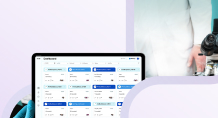Technology is conquering industry after industry. There are plenty of examples which signify the overwhelming power of the technologically-progressing world. The power which urges multiple ecosystems to absorb and either entirely or partially to adapt to this modernized archetype. It is no surprise that because of this technical evolution, or revolution, business paradigms are shifting in a dramatic pace. Inevitably, then, social media, the Internet, consumers’ hyper- and even cyber-connection, digital dependence and many other similar factors are causing intensively magnetized quantum jump onward. It is a leap forward to a technology-prevailed existence not only on a personal level but on a corporate level as well. Everything is different. Everything is changing. Everything is sort of moving towards digitalising.
Usually such major changes come in waves. Yet, by the look of it, the last couple of years have become years of extremism in development and progress. And instead of wave, we have got a tsunami which is ready to wipe out the familiar status of businesses as we know them.
It’s been centuries after the use of phonographs or turntables to play records. Long gone are the days of audiotapes and even CDs. Innovations such as iPod and iTunes transformed the music industry ostensibly. And this is not all. Similarly, the automotive industry, the film industry, the entertainment industry, publishing and many others are directly affected by the disruptive solidity of high-tech creations. Which leads us to believe that technology holds the potential of our future, of what we do and how we do it. And being such, technology turns into a goldmine for any sector.
Technologies and Clinical Trials

Getting to grips with the scope of perspectives that arrive with the incorporation of technologies, specialists working in the Pharmaceutical, Medical and Clinical field become more and more open to transformations that are absolutely tech-driven. And since the successful growth of these industries demands innovative approaches, professionals come to realise that the three-segmented connection between their profession, technologies and desirable results will bring just the perfect dose of innovation.
What is Clinical Trials?
To present it in the simplest way, clinical trials represent research studies which aim to improve medical approaches and ways of treatment by investigating the safety, effectiveness and usefulness of new medicinal products. These studies are carried out in order to discover efficient ways to treat, prevent, or diagnose illnesses and diseases. The research usually involves human beings and therefore it requires strict compliance with number of requirements, laws and ethical considerations.
Where is the meeting point between Clinical Trials and the world of technologies?

One of the most significant evolutions in clinical research is the replacement of paper-based processes with electronic-based ones. In this industry, there is a huge volume of data which needs to be gathered, processed and stored in such a way as to promise high-level productivity and ease of work. An example of already implemented e-focused decision is the so called Electronic Data Capture (EDC) system. Such web-based system or software facilitates the work of sponsors or CROs (Contract Research Organizations) by enabling them to collect cleaner data faster and more efficiently.
Moreover, thanks to new technological developments, remote clinical trials are already a fact. Trial participants are no longer required to travel from one place to another. The progress of their treatment can be monitored and navigated with the help of different devices.
The overall management of clinical studies is also improved by clinical trial management systems (CTMS). But what exactly are these and how do they function?
Clinical Trial Management Systems

CTMS is a software system which maintains and controls various key processes that are part of a trial – planning, performing and reporting. In addition to this, such systems are widely used to track deadlines and manage individual information of trial participants.
What are the benefits of CTMS?
- Real-time operations
Clinical trial management systems offers sponsors and collaborators easy access to a large amount of data at any time. What is more, this type of software works to provide with an instant overview into a range of trial activities and operations.
- Improved data collection
Taking advantage of CTMS, researchers are enabled to achieve better data collection, greater efficacy, reinforced validation as well as more detailed and quicker analysis.
- Saving on time
Users are given a chance to dedicate less of their time on entering data into scattered locations manually. On top of this, human mistakes will be minimized and people will spend less efforts and time on correcting the errors.
- Saving on costs
CTMS can reduce the resources for patient searching, patient recruitment, patient registry and so on. Systems of this kind are also able to provide with cheaper financial management features and tools that offer easier ways for monitoring incoming and outgoing payments.
Other advantages include more efficient regulatory processes related to protocols, amendments and other documentation, increased staff productivity and so on.
To sum up, every possible industry seems to be well-fitting the powerful medium of the technological reality. From film and media to Pharmacy, the influence of IT developments is obvious. Consequently, the landscape of these and other sectors are transmuted. Following current trends and tendencies they metamorphose into something that is extremely tech-responsive. And when such modifications are accomplished for such a short period of time, imagine what lies in the years ahead…














